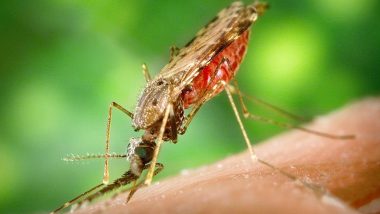Every year April 25 is observed as World Malaria Day around the world to raise awareness about this potentially fatal disease, which claims millions of lives worldwide. The theme for World Malaria Day 2019 is “Zero Malaria Starts with Me” and it is being hosted by the World Health Organization (WHO). A large part of treating malaria effectively depends on detecting the symptoms at the earliest before it reaches a more severe stage. Here are some of the commonest symptoms of malaria. World Malaria Day 2019: History, Theme and Significance of the Day for Awareness About the Mosquito-Borne Disease.
What is Malaria?
Malaria is caused by the bite of an infected Anopheles mosquito, which carries the Plasmodium parasite. The pathogens enter the bloodstream through the saliva of the Anopheles mosquito.
These parasites then travel to the liver, where they mature, and after several days they multiply and enter the red blood cell.
Within the span of 48 to 72 hours, the parasites start to multiply in the bloodstream which leads to infection, and then the early symptoms of malaria start showing. World Malaria Day 2019: How to Identify a Female Anopheles Mosquito (Before You Get Bitten)
Symptoms of Malaria
The National Health Safety (NHS) states that early symptoms of malaria include a high body temperature of 38C or above. Symptoms typically appear between seven and 18 days after a person becomes infected.
It is very vital to identify the symptoms of malaria before it gets too late and parasites spread in great numbers inside the body. Some common symptoms of malaria include:
- high fever
- severe shivering
- headache
- nausea and vomiting
- severe abdominal pain
- muscular pain
Some people experience cycles of malaria attacks, which usually start with shivering and chills, followed by a high fever and then back to normal temperature.
How to Prevent Malaria?
The world's first and only malaria vaccine was launched in the African country of Malawi on April 23, 2019. According to WHO, RTS, S vaccine can reduce Malaria in children. The vaccine will be available to children from 5 months old to 2 years. Home Remedies For Malaria and Dengue: 5 Ingredients To Treat These Vector-Borne Diseases At Home.
First Malaria Vaccine launched in Malawi!!!
Other precautionary measures include sleeping under an insecticide-treated mosquito net, using mosquito repellent lotion on your skin to avoid from getting bitten by mosquitoes, wearing full-sleeved and ankle-lengthed clothes, shutting windows and doors in the evening and night and treating stagnant water with insecticides.
To gain immunity to the illness, it's also important to have the right kind of diet. Consuming immunity-boosting foods such as ginger, cinnamon, fenugreek, citrus fruits, watermelons, carrots, nuts, eggs, chicken, papaya, yoghurt, lentils, legumes, etc. will help strengthen the immune system, which will ward off the protozoan.
NHS states that if malaria is diagnosed and treated quickly, people will make a full recovery. Hence it is important to detect the symptoms of malaria at the earliest.
(The above story first appeared on LatestLY on Apr 25, 2019 11:58 AM IST. For more news and updates on politics, world, sports, entertainment and lifestyle, log on to our website latestly.com).













 Quickly
Quickly


